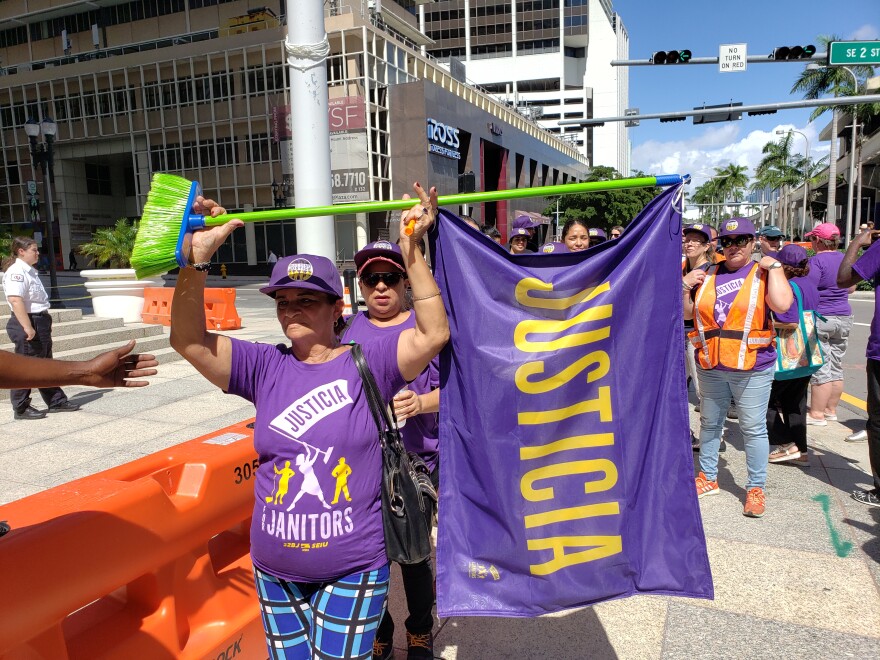The protest signs read “Could you live on $8.46 cents?”
About 24 janitors, mostly women, marched and held up brooms in front of Miami’s tallest office tower — the Southeast Financial Center in the heart of downtown.
Most large office buildings outsource their janitorial services to cleaning companies. Those companies often hire contract workers. Compared to other parts of the state, South Florida’s contracted office cleaners earn among the lowest wages and there's a new push to unionize this workforce.
Commercial janitors in Miami-Dade are predominantly immigrant women from across Latin America and the Caribbean. They typically earn less than $9 an hour.
Enez Georges is from Haiti and she works after-hours cleaning the bathrooms inside the financial center .
“The boss needs to give us a raise” she said in Haitian-Creole during the protest.
Her employer, Harvard Maintenance, did not respond to WLRN’s request for comment.
Georges works 20 hours a week. She says she struggles to pay her monthly bills. When she talks about maybe taking a vacation someday, she starts to laugh.
There’s just no way that’s going to happen, she says — not with her current pay.
A recent study from UCLA’s Center for Neighborhood Knowledge and SEIU, found that compared to other larger cities — Chicago, Denver and Baltimore — Miami janitors earn about $3 less an hour.
And when adjusted for cost of living, contracted commercial janitors in Miami also earn less than their counterparts in Tallahassee, Gainesville and Tampa, according to the study.
Miriam Alba, from Nicaragua, worked in the cleaning and janitorial industry for more than a decade.
She says one of the few times workers get raises is when the minimum wage goes up.
Alba says she barely knows when it’s her grandchildren’s birthday or her own birthday because she works seven days a week to be able to pay her rent.
She wakes up at 4 a.m. to cook breakfast and lunch at a restaurant. In the late afternoons, she might get a private job cleaning someone’s home. And late at night, she used to clean an office building in Miami.
Georges and Alba are part of the Justice for Janitors movement in South Florida to unionize contracted commercial cleaners.
They’re working with SEIU, Service Employees International Union. Alba was a vocal union organizer at her old job at the Cambridge Innovation Center, or the CIC, in Miami.
She lists some of their demands: “a salary increase, right to vacation time, right to health care.”
Alba recently quit after she says she was singled out by her employer for organizing, but she’s still working with other janitors to unionize.
Coastal Building Maintenance, the company she used to work for, denies any wrongdoing or mistreatment of workers.
In a statement to WLRN, a spokesperson for the company wrote, “CBM treats, and has always treated its employees fairly and meets industry standards for both wages and benefits.”
The janitors have gotten support from some of the tenants in the buildings they clean. Several joined the protest at the CIC building a couple months ago.
Logan Meza works for the S.O.U.L Sister Leadership Collective, a nonprofit that focuses on young women of color and inequality.
“People need to get paid and make sure that they have enough to be able to provide for their family,” she said. "And if it's just the custodial staff that's out here, it makes it easier to be ignored.”
Local elected officials have also joined the janitors in calling for a living wage.
Florida state Rep. Cindy Polo, a Democrat who represents parts of Doral, Hialeah and Miramar, joined the janitors in protest in front of the CIC building.
“This group of hard workers all they want is to be able to provide for their families,” Polo said. “And what they want and need is to be treated with respect which includes a liveable wage, benefits [and] time off to take care of sick loved ones.”
WLRN producer Alejandra Martinez contributed to this report.




